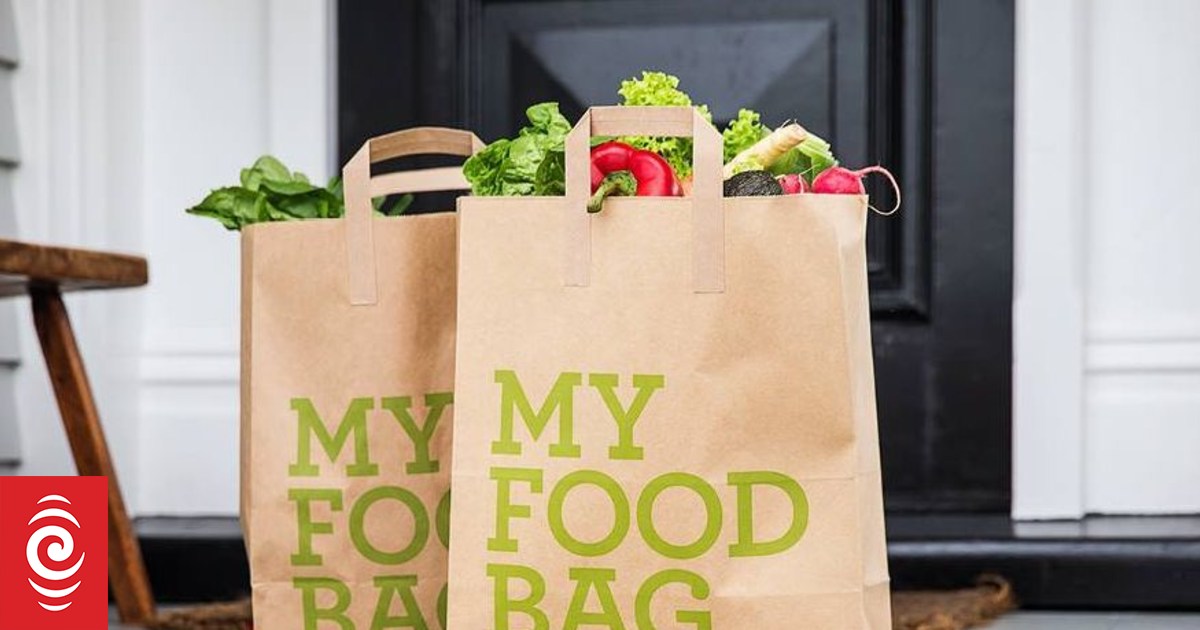My Food Bag’s share price dropped to about 25 cents on Friday.
Photo: Facebook / My Food Bag
My Food Bag shares are now worth about 85 percent less than when the company listed and market commentators say it’s not the only IPO that’s gone sour in recent years.
The share price has dropped from $1.85 when the company listed on the NZX in 2021 to about 25c on Friday.
Greg Smith, head of retail at Devon Funds, said there were several others that had been delivered significant losses for investors.
Wynyard, which listed in July 2013 had an IPO of $1.15 a share. It went bust in 2016, representing a 100 percent loss in three years.
Snakk Media was a compliance listing, which meant no money was raised from investors, but the share price fell from 12c to 1c in 2018 when it delisted.
GeoOp in October 2013 had a $10 million raise at $1 each, but went to 10c when it unlisted in 2019. Veritas, a reverse listing from Mad Butcher, listed at $1 in 2011 and delisted at 10c in 2020.
“The most well-known would have to be My Food Bag,” he said.
“It was an exit out of private equity, in peak conditions. It was about as good a story as they were ever going to get.
“People got caught up in the brand and story, in lock downs, ordering meal kits – we didn’t have the cost-of-living pressures we have now.”
He said IPOs that were coming from being privately held often did not do well because the seller wanted to maximise their position.
“The other thing is in New Zealand there’s been such a shortage of them.
“Investors are prepared to almost jump on board just about anything because there’s been such a shortage.”
There have only been about half-a-dozen IPOs on the NZX in recent years.
“It’s not to say people can’t do well out of IPOs, we do see it overseas that IPOs have gone well, particularly with tech but we don’t really have technology stocks here.”
Rupert Carlyon, founder of Kernel Wealth, said CBL was another that was worth mentioning. The company failed but had a market cap of $700 million at its peak.
“Another big NZ business that has recently delisted from the ASX is Laybuy.”
He said the fact that businesses failed was not a massive issue on its own.
“That is capitalism, the problem is that we are not really getting the high quality businesses list to offset some of these loss making companies on the other side.
“Personally, I think that the structure of our investment market makes things really hard, overseas there are a large number of small cap funds that specialise in investing in small companies and are typically the funds that will invest in these smaller IPOs.
“IPOs are a huge amount of work, and you only want to do the work if you can put a decent amount of capital to work.”
He said New Zealand had a “barbell” approach, with strong retail investors on one side and large KiwiSaver funds on the other.
“Retail investors typically look for brands they know and business models they can easily understand, more often than not they are advised by a traditional adviser who is incentivised to keep it safe and not take too much risk. This is one of the reasons why the tech companies are going to Australia – advisers and retail investors don’t want to do the work and don’t recognise the brands.
“The larger KiwiSaver providers struggle to get in behind the smaller IPOs as the potential investment size does not justify the work and the smaller funds often do not have the capability.
“If you have a $1 billion fund then doing a huge amount of work to make a $5-10 million investment is not a great use of time… It was a real shame that the Mainland business did not go to IPO. That was a large business with recognisable brands, so would have been a perfect IPO candidate.”
Susannah Batley, general manager of Sharesies Business, said Xero was an IPO success story.
It listed in 2007, although it eventually delisted and is now only trading on the ASX.
“It’s a good example of the benefit of a listing. Rod [Drury] could retain control of the company and keep leading but bring other shareholders with him on the journey. As it needed more capital it could raise those amounts at very important times.”
She said it also allowed the company to have an appealing company share scheme, because it could offer shares that could be easily traded.
She said it was important that when a company went to IPO, it was not solely with the intention of shareholder selling.
“If you’ve got investors who want to sell, you should be taking care of that before the IPO, so the IPO can set the company up for success, when shareholders come on they are having a good experience, not a flood of shares up for sale on the market early on.”
Batley said there was an international trend towards not listing.
“For small companies, the costs don’t necessarily scale right down for size but globally even some really large companies have stayed private, like Stripe.”
She said data indicated more than 87 percent of US companies with revenue over US$100m were private.
Carlyon said it was important to differentiate between reverse listings, such as Veritas, and IPOs.
“Reverse listings don’t get the scrutiny as they are not really aimed at the institutional investor market and have significantly lower disclosure requirements. I struggle to think of a reverse listing that has worked to be honest.”
Sign up for Ngā Pitopito Kōrero, a daily newsletter curated by our editors and delivered straight to your inbox every weekday.

